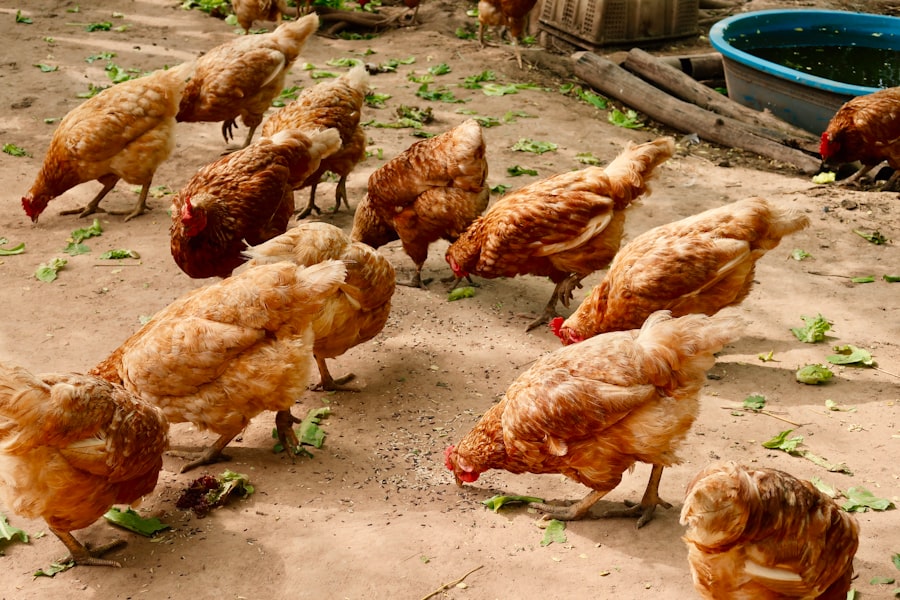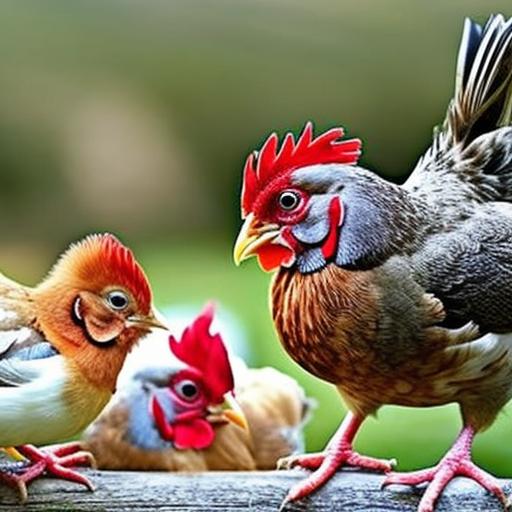Keeping chickens has become an increasingly popular hobby for many people, whether they live in rural areas or in urban settings. Not only do chickens provide fresh eggs daily, but they also offer the opportunity to connect with nature and experience the joy of watching their quirky personalities. Whether you are interested in keeping chickens for sustainable living or simply as a fun hobby, there are many benefits to be gained from raising these feathered friends.
Key Takeaways
- Keeping chickens has many benefits, including fresh eggs, pest control, and fertilizer production.
- Basic requirements for keeping chickens include a secure coop, access to food and water, and proper ventilation.
- Choosing the right chicken coop involves considering factors such as size, materials, and location.
- Building a chicken coop from scratch can be a cost-effective option, but requires careful planning and construction.
- DIY chicken feeders, waterers, nesting boxes, and chicken run designs can save money and provide customization options.
Benefits of Raising Chickens
One of the most obvious benefits of keeping chickens is the abundance of fresh eggs that they provide. There is nothing quite like collecting eggs from your own backyard and enjoying them for breakfast. Not only are these eggs delicious, but they are also healthier than store-bought eggs. Chickens that are allowed to roam freely and eat a natural diet produce eggs that are higher in omega-3 fatty acids and vitamins.
In addition to the eggs, chickens also provide another valuable resource – their manure. Chicken manure is an excellent fertilizer for gardens and can help improve soil quality and fertility. It is rich in nitrogen, phosphorus, and potassium, which are essential nutrients for plant growth. By using chicken manure as fertilizer, you can reduce your reliance on chemical fertilizers and create a more sustainable garden.
Furthermore, keeping chickens can be a source of entertainment and joy. Chickens have unique personalities and behaviors that can be fascinating to observe. They have their own social hierarchy and will often engage in amusing antics such as dust bathing or chasing after insects. Watching chickens can be a calming and therapeutic experience, providing a sense of connection with nature.
Basic Requirements for Keeping Chickens
Before getting started with keeping chickens, it is important to understand their basic needs. Chickens require food, water, shelter, and space to thrive. When it comes to food, chickens need a balanced diet that includes grains, protein, vitamins, and minerals. Commercial chicken feed is readily available and provides all the necessary nutrients. However, chickens also enjoy foraging for insects and greens, so it is beneficial to allow them access to a grassy area or provide them with kitchen scraps.
Water is another essential requirement for chickens. They need a constant supply of clean, fresh water to stay hydrated and healthy. It is important to regularly check and refill their water containers to ensure they have access to water at all times.
When it comes to shelter, chickens need a safe and secure coop to protect them from predators and the elements. The coop should be well-ventilated to prevent the buildup of moisture and ammonia from their droppings. It should also provide enough space for the chickens to move around comfortably and have separate areas for roosting and nesting.
Choosing the Right Chicken Coop
There are various types of chicken coops available in the market, ranging from small portable coops to larger stationary ones. When choosing a chicken coop, it is important to consider factors such as size, ventilation, ease of cleaning, and predator protection.
The size of the coop will depend on the number of chickens you plan to keep. As a general rule of thumb, each chicken should have at least 4 square feet of indoor space and 10 square feet of outdoor space in the run area. This will ensure that they have enough room to move around comfortably.
Ventilation is crucial in a chicken coop to prevent the buildup of moisture and ammonia from their droppings. The coop should have windows or vents that can be opened or closed depending on the weather conditions. This will help maintain good air quality and prevent respiratory issues in the chickens.
Cleaning the coop is an important aspect of chicken keeping. A coop that is easy to clean will save you time and effort in maintaining a healthy environment for your chickens. Look for coops with removable trays or floors that can be easily cleaned and sanitized.
Lastly, predator protection is essential to keep your chickens safe. The coop should have sturdy walls and a secure door that can be locked at night. It should also have a wire mesh or hardware cloth that is buried in the ground to prevent predators from digging under the coop.
Building a Chicken Coop from Scratch
Building a chicken coop from scratch can be a rewarding and cost-effective option for those who are handy with tools. Not only does it allow you to customize the coop to your specific needs, but it also gives you the satisfaction of creating something with your own hands.
To build a chicken coop from scratch, you will need some basic materials such as lumber, screws, nails, wire mesh, and roofing materials. The first step is to design the coop based on the number of chickens you plan to keep and the available space in your backyard. It should include areas for roosting, nesting, and feeding.
Once you have a design in mind, you can start gathering the materials and cutting the lumber according to your measurements. Assemble the walls, floor, and roof using screws or nails. Install the wire mesh on the windows and vents for ventilation and predator protection. Finally, add the nesting boxes, roosting bars, and feeders inside the coop.
Building a chicken coop from scratch requires some basic carpentry skills and tools. If you are not confident in your abilities, there are also pre-made coop kits available that can be assembled with minimal effort.
DIY Chicken Feeders and Waterers

While there are many types of chicken feeders and waterers available in stores, making your own can be a fun and cost-effective option. DIY feeders and waterers can be made from simple materials such as buckets, PVC pipes, or even recycled materials.
One popular DIY feeder option is the PVC pipe feeder. This feeder consists of a length of PVC pipe with holes drilled into it. The pipe is then filled with chicken feed, and the chickens can peck at the feed through the holes. This type of feeder helps reduce waste and keeps the feed clean and dry.
For a DIY waterer, a simple option is to use a bucket or container with a poultry nipple attached to the bottom. The nipple allows the chickens to drink water without spilling or contaminating it. This type of waterer is easy to clean and prevents the chickens from fouling the water.
When making DIY feeders and waterers, it is important to ensure that they are sturdy and secure. Chickens can be quite curious and may try to knock over or damage poorly constructed feeders and waterers.
Homemade Nesting Boxes for Chickens
Providing nesting boxes for your chickens is essential if you want them to lay eggs in a designated area. Nesting boxes should be dark, quiet, and comfortable to encourage hens to lay their eggs there instead of in random places around the coop.
Nesting boxes can be made from a variety of materials such as wood, plastic bins, or even repurposed items like milk crates. The size of the nesting box will depend on the breed and size of your chickens, but a general guideline is to have one nesting box for every 3-4 hens.
To make a simple nesting box from wood, start by cutting four pieces of plywood or lumber for the sides, bottom, and back of the box. Assemble the pieces using screws or nails, leaving one side open for easy access. Attach a hinged lid to the top of the box for easy egg collection.
Line the inside of the nesting box with straw or wood shavings to provide a soft and comfortable surface for the hens. It is important to regularly clean and replace the bedding material to maintain good hygiene and prevent the spread of diseases.
Chicken Run Ideas and Designs
A chicken run is an enclosed outdoor area where chickens can exercise, forage, and enjoy the sunshine. It is important to provide a chicken run for your chickens to ensure their physical and mental well-being.
When designing a chicken run, it is important to consider factors such as size, security, and accessibility. The size of the run will depend on the number of chickens you have and the available space in your backyard. As a general rule of thumb, each chicken should have at least 10 square feet of outdoor space.
Security is crucial in a chicken run to protect your chickens from predators. The run should have sturdy walls made of wire mesh or hardware cloth that is buried in the ground to prevent predators from digging under. It should also have a secure door that can be locked at night.
In terms of accessibility, it is important to provide easy access to the chicken run from the coop. This can be achieved by installing a small door or ramp that allows the chickens to move freely between the coop and the run.
When it comes to design, there are many creative and practical ideas for chicken runs. Some people choose to incorporate natural elements such as trees or shrubs into the run to provide shade and hiding spots for the chickens. Others add features such as perches, dust bathing areas, or even small ponds for the chickens to enjoy.
Egg Incubators for Hatching Chicks
If you are interested in hatching chicks at home, an egg incubator is an essential tool. Incubators provide a controlled environment for eggs to develop and hatch into healthy chicks.
There are various types of egg incubators available, ranging from small tabletop models to larger cabinet-style units. The type of incubator you choose will depend on your needs and budget.
The basic principle behind an egg incubator is to maintain a constant temperature and humidity level throughout the incubation period. Most incubators have a built-in thermostat and humidity control system to achieve this. It is important to regularly monitor and adjust these settings to ensure optimal conditions for the eggs.
To use an egg incubator, start by collecting fertile eggs from your own flock or purchasing them from a reputable source. Place the eggs in the incubator with the pointed end facing downwards. Turn the eggs at least three times a day to prevent the embryos from sticking to the shell.
During the incubation period, which typically lasts around 21 days, it is important to maintain a stable temperature between 99-101 degrees Fahrenheit and a humidity level of around 50-55%. This can be achieved by following the manufacturer’s instructions and regularly monitoring the temperature and humidity levels.
Natural Remedies for Chicken Health and Wellness
Maintaining the health and wellness of your chickens is essential for their overall well-being and productivity. While there are various commercial products available for treating common chicken health issues, there are also natural remedies that can be effective and safe.
One common health issue in chickens is external parasites such as mites and lice. These pests can cause irritation, feather loss, and even anemia in severe cases. To treat external parasites naturally, you can use diatomaceous earth, which is a fine powder made from fossilized algae. Simply dust the affected areas of the chicken’s body with diatomaceous earth to kill the parasites.
Respiratory infections are another common health issue in chickens, especially during colder months. To prevent and treat respiratory infections naturally, you can add garlic or apple cider vinegar to their drinking water. These natural remedies have antimicrobial properties that can help boost the immune system and fight off infections.
Prevention is always better than cure when it comes to chicken health. To prevent health issues in chickens, it is important to provide a clean and hygienic environment for them. Regularly clean and disinfect the coop, provide fresh bedding material, and ensure that the feed and water containers are clean and free from contamination.
Keeping chickens can be a fun and rewarding hobby or a sustainable way to produce your own food. Not only do chickens provide fresh eggs daily, but they also offer the opportunity to connect with nature and experience the joy of watching their quirky personalities. By providing them with the basic requirements such as food, water, shelter, and space, you can ensure their health and well-being. Whether you choose to build a chicken coop from scratch or purchase a pre-made one, there are many options available to suit your needs. Additionally, making your own DIY feeders, waterers, nesting boxes, and chicken runs can be a cost-effective and creative way to enhance your chicken-keeping experience. By using natural remedies for common health issues and practicing good hygiene, you can maintain the health and wellness of your chickens. So why not consider keeping chickens as a fun and rewarding hobby or for sustainable living?
Looking for some inspiration for your DIY chicken projects? Check out this article on Poultry Wizard that features 50 do-it-yourself projects for keeping chickens. From building an A-frame chicken coop (source) to creating a farmhouse-style chicken coop (source), and even tips on constructing a chicken coop in Chester, SC (source), this comprehensive list has everything you need to create a comfortable and functional space for your feathered friends.
FAQs
What is the article about?
The article is about 50 do-it-yourself projects that can help you keep chickens.
What are some of the projects mentioned in the article?
Some of the projects mentioned in the article include building a chicken coop, creating a chicken run, making a chicken feeder, constructing a nesting box, and building a dust bath.
Do I need any special skills to complete these projects?
Most of the projects mentioned in the article can be completed by anyone with basic DIY skills. However, some of the more complex projects may require more advanced skills.
What materials do I need to complete these projects?
The materials needed for each project will vary, but some common materials include wood, wire mesh, screws, nails, and hardware cloth.
How much will it cost to complete these projects?
The cost of each project will vary depending on the materials used and the size of the project. Some projects can be completed for under $50, while others may cost several hundred dollars.
Will these projects help me save money on chicken keeping?
Yes, completing these DIY projects can help you save money on chicken keeping. By building your own coop, feeder, and other accessories, you can avoid the high cost of pre-made products.
Are these projects safe for my chickens?
Yes, these projects are designed to be safe for chickens. However, it is important to follow the instructions carefully and ensure that all materials used are non-toxic and safe for chickens.
Can I customize these projects to fit my specific needs?
Yes, many of these projects can be customized to fit your specific needs. For example, you can adjust the size of a coop or run to accommodate more chickens or to fit in a specific area of your yard.
Meet Walter, the feathered-friend fanatic of Florida! Nestled in the sunshine state, Walter struts through life with his feathered companions, clucking his way to happiness. With a coop that’s fancier than a five-star hotel, he’s the Don Juan of the chicken world. When he’s not teaching his hens to do the cha-cha, you’ll find him in a heated debate with his prized rooster, Sir Clucks-a-Lot. Walter’s poultry passion is no yolk; he’s the sunny-side-up guy you never knew you needed in your flock of friends!







